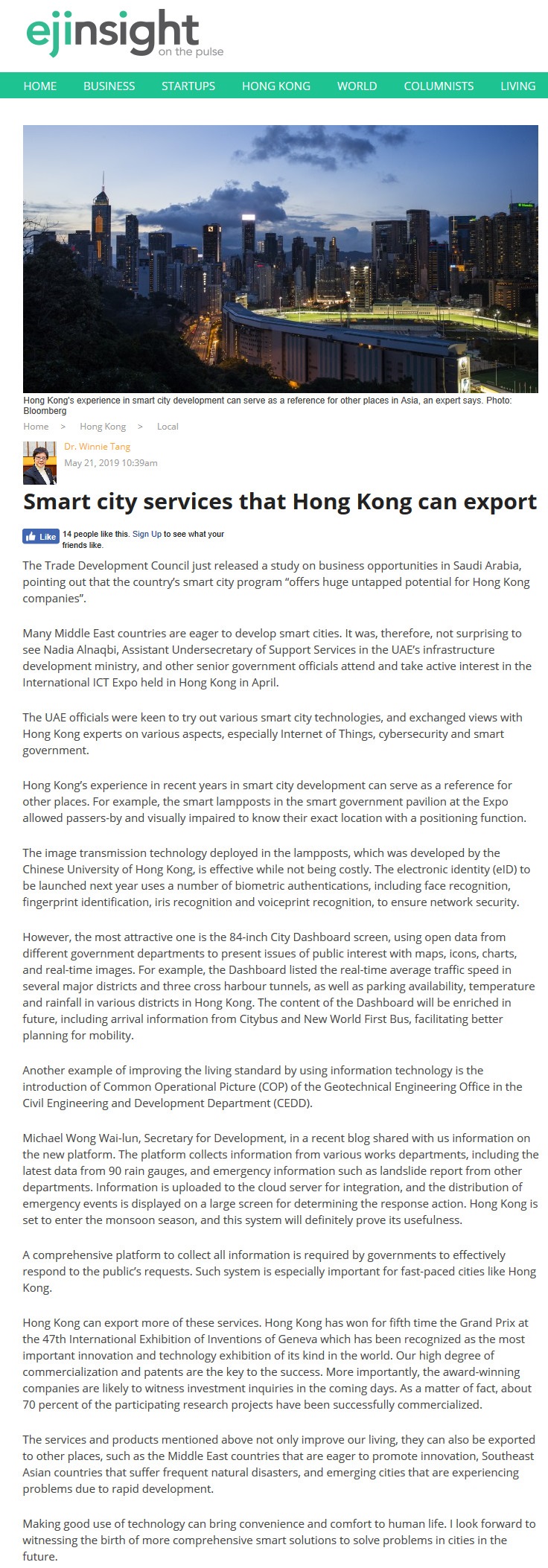網上版請按此

Smart city services that Hong Kong can export
The Trade Development Council just released a study on business opportunities in Saudi Arabia, pointing out that the country's smart city program "offers huge untapped potential for Hong Kong companies".
Many Middle East countries are eager to develop smart cities. It was, therefore, not surprising to see Nadia Alnaqbi, Assistant Undersecretary of Support Services in the UAE's infrastructure development ministry, and other senior government officials attend and take active interest in the International ICT Expo held in Hong Kong in April.
The UAE officials were keen to try out various smart city technologies, and exchanged views with Hong Kong experts on various aspects, especially Internet of Things, cybersecurity and smart government.
Hong Kong's experience in recent years in smart city development can serve as a reference for other places. For example, the smart lampposts in the smart government pavilion at the Expo allowed passers-by and visually impaired to know their exact location with a positioning function.
The image transmission technology deployed in the lampposts, which was developed by the Chinese University of Hong Kong, is effective while not being costly. The electronic identity (eID) to be launched next year uses a number of biometric authentications, including face recognition, fingerprint identification, iris recognition and voiceprint recognition, to ensure network security.
However, the most attractive one is the 84-inch City Dashboard screen, using open data from different government departments to present issues of public interest with maps, icons, charts, and real-time images. For example, the Dashboard listed the real-time average traffic speed in several major districts and three cross harbour tunnels, as well as parking availability, temperature and rainfall in various districts in Hong Kong. The content of the Dashboard will be enriched in future, including arrival information from Citybus and New World First Bus, facilitating better planning for mobility.
Another example of improving the living standard by using information technology is the introduction of Common Operational Picture (COP) of the Geotechnical Engineering Office in the Civil Engineering and Development Department (CEDD).
Michael Wong Wai-lun, Secretary for Development, in a recent blog shared with us information on the new platform. The platform collects information from various works departments, including the latest data from 90 rain gauges, and emergency information such as landslide report from other departments. Information is uploaded to the cloud server for integration, and the distribution of emergency events is displayed on a large screen for determining the response action. Hong Kong is set to enter the monsoon season, and this system will definitely prove its usefulness.
A comprehensive platform to collect all information is required by governments to effectively respond to the public's requests. Such system is especially important for fast-paced cities like Hong Kong.
Hong Kong can export more of these services. Hong Kong has won for fifth time the Grand Prix at the 47th International Exhibition of Inventions of Geneva which has been recognized as the most important innovation and technology exhibition of its kind in the world. Our high degree of commercialization and patents are the key to the success. More importantly, the award-winning companies are likely to witness investment inquiries in the coming days. As a matter of fact, about 70 percent of the participating research projects have been successfully commercialized.
The services and products mentioned above not only improve our living, they can also be exported to other places, such as the Middle East countries that are eager to promote innovation, Southeast Asian countries that suffer frequent natural disasters, and emerging cities that are experiencing problems due to rapid development.
Making good use of technology can bring convenience and comfort to human life. I look forward to witnessing the birth of more comprehensive smart solutions to solve problems in cities in the future.
Dr. Winnie Tang
Adjunct Professor, Department of Computer Science, Faculty of Engineering and Faculty of Architecture, The University of Hong Kong